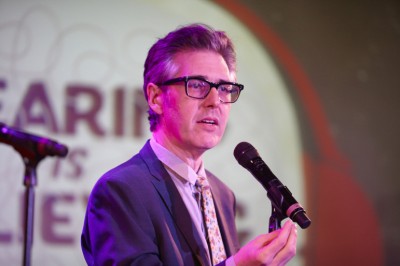America’s National Public Radio (NPR) Is Ready for the “Good” Kind of Capitalism

Ira Glass tell advertisers: “Public radio is ready for capitalism.” (photo: Matthew Septimus/NPR)
“My hope is that we can move away from a model of asking listeners for money and join the free market,” host of public radio’s This American Life Ira Glass declared last month (Ad Age, 4/30/15):
I think we’re ready for capitalism which made this country so great. Public radio is ready for capitalism.
The context was “Hearing Is Believing,” an event sponsored by NPR and member stations WNYC and WBEZ to pitch public radio (and its podcasts) as an advertising vehicle (American Community Radio, 5/12/15).
Last week, Glass wrote a column in the public broadcasting trade paper Current (5/13/15) to “clarify” his comments: He was not suggesting that programmers “chase ratings and destroy everything that makes public radio special.” Instead, he meant he wanted “companies [to] come on our shows and pay lots of money,” and then public radio should use that money for good things–not bad things, as you might have assumed that he meant.
“It feels almost insulting to have to say,” Glass says, that he’s not calling for “turn[ing] public radio into a moronic money-grabbing wasteland of commercial shillery.” Likewise, it feels almost insulting to point out to Glass that noncommercial broadcasting was founded to be an alternative to commercial broadcasting.
The problem with commercial broadcasting was not that everyone in it had bad intentions. Nor was noncommercial broadcasting set up as place where all the broadcasters with good intentions would gather. The founding principal, rather, was that there needed to be a space on the broadcasting spectrum where programming was not dependent on advertising dollars–because it was recognized that relying on corporate sponsors inherently limits the kind of shows you can do and colors what you put on the air.
That’s why they called it “noncommercial radio” rather than “good intentions radio.”
In a “trust me” moment, Glass quotes his mother:
She used to say that the best predictor of a person’s future behavior is his or her past behavior. I see no reason why public radio programmers would be exempt from that principle.
When FAIR has looked in the past at the programming of public radio, actually, we’ve found it’s left a lot to be desired. Public radio has long depended on corporate “underwriters” for a significant segment of its funding, and it’s long exhibited the same narrow guestlists typical of the commercial broadcasting that public radio is supposed to be an alternative to.
When we did a study in 2004 (Extra!, 5-6/04), for example, of the sources on All Things Considered, Morning Edition and Weekend Edition, we found that these shows’ regular commentators were 80 percent white and 76 percent male. An earlier study of All Things Considered and Morning Edition (Extra!, 4-5/93) found commentators who were 96 percent white and 85 percent male.
Both studies found that viewpoints from outside the two-party system were rare, and within that system there was a conservative slant: Among partisan sources (politicians, campaign officials and the like), Republicans outnumbered Democrats by more than 3 to 2 (61 percent to 38 percent) in 2004, during the Bush administration, and by a smaller margin (57 percent to 42 percent) in 1993, when Bill Clinton was president.
It’s unclear how going after corporate dollars more aggressively is going to make NPR‘s programming more inclusive or less narrow.
Glass also clarified that when he said he wanted to “move away from a model of asking listeners for money and join the free market,” he didn’t mean he wanted to stop asking listeners for money:
Listener donations are not going away. And they shouldn’t go away. Public support is one of the foundations of public radio, one of its great strengths, something that gives listeners a connection to our work and a sense of ownership over what we do that’s literal. It’s hard to imagine a healthy public radio system without it.
It’s not clear, though, why getting money from listeners gives them “a sense of ownership over what we do that’s literal” but getting money from corporations does not likewise give them a literal sense of ownership. Perhaps Glass can clarify that in a future column.
Hear Jim Naureckas debate advertising on public radio on KCRW‘s To the Point (5/22/15).

